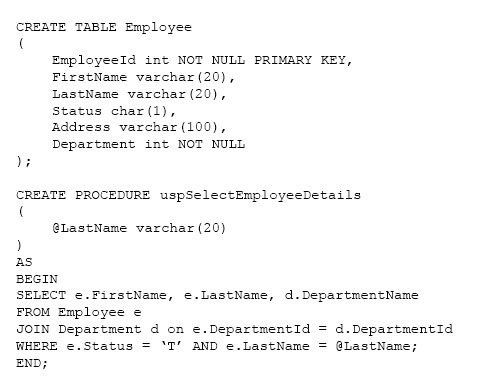

Note: This question is part of a series of questions that use the same or similar answer choices. An answer choice may be correct for more than one question in the series. Each question is independent of the other questions in this series. Information and details provided in a question apply only to that question.
You have a database named DB1. There is no memory-optimized filegroup in the database.
You have a table and a stored procedure that were created by running the following Transact-SQL statements:
The Employee table is persisted on disk. You add 2,000 records to the Employee table.
You need to create an index that meets the following requirements:
✑ Optimizes the performance of the stored procedure.
✑ Covers all the columns required from the Employee table.
✑ Uses FirstName and LastName as included columns.
✑ Minimizes index storage size and index key size.
What should you do?
eric0117
Highly Voted 5 years, 5 months agoCageman
Highly Voted 5 years, 5 months agoJohnFan
5 years, 3 months agoHA2020
Most Recent 4 years, 5 months agoHA2020
4 years, 5 months agoHA2020
4 years, 5 months agoTheDUdeu
4 years, 5 months agoAlex5x
4 years, 7 months agoazskierphoto
4 years, 6 months agoTheDUdeu
4 years, 5 months agoLuzix
4 years, 7 months agoCococo
4 years, 10 months agoMosufe
4 years, 10 months agoCococo
4 years, 9 months agostm22
4 years, 11 months agoChocho
4 years, 11 months agoChocho
4 years, 11 months ago